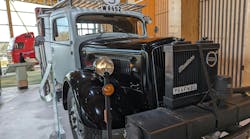LOUISVILLE, KY. Chris Patterson, president & CEO of Freightliner LLC, said his company’s truck brands—Freightliner, Sterling and Western Star—are benefiting from the globalization efforts of their parent company, DaimlerChrysler.
One example is the use of selective catalytic reduction (SCR) emissions control technology, which was developed in Europe, in Freightliner trucks to help meet 2010 regulations. According to Elmar Boekenhoff, Freightliner’s senior vp-engineering and technology, SCR can improve fuel economy up to 10% more than the EGR platforms currently used in the U.S.
“It’s all about where you attempt to reduce oxides of nitrogen (NOx) formation,” he explained. “If you attempt to reduce those levels within the engine, there’s a price to pay for that: engine efficiency and fuel economy.” According to Boekenhoff, you don’t suffer those losses when you use SCR because it eliminates NOx in the exhaust stream.
Patterson noted that for 2007, Freightliner has already accumulated 14.8-million test miles with ’07-compliant engines built by its sister companies, the Detroit Diesel Series 60 and the Mercedes-Benz MBE 4000 and 900, as well as the Cummins ISB for the medium-duty line.
Part of the reason DaimlerChrysler is trying to build more global leverage for the Freightliner LLC truck brands is to find ways to lower the costs associated ’07 emissions compliance. Patterson said Freightliner expects its ’07 medium-duty trucks, equipped with Cummins’ ISB engine or the MBE 900, to cost between $4,500 and $6,000 more per vehicle. Class 8’s spec’d with the Series 60 or the MBE will see the base sticker price jump anywhere from $7,000 to $10,000.
Price increases for trucks equipped with Caterpillar C-13 or C-15 engines have not yet been established, he added.
“We’re working vigorously to try and reduce those costs and we’re looking to the global leverage of DaimlerChrysler to help us do that,” said Patterson. “That’s the benefit to co-developing trucks and engines together, within the same family of companies, rather than serially.”


